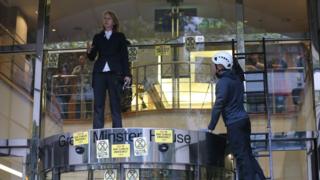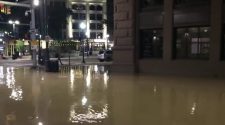
Image copyright
Getty Images
Extinction Rebellion is calling on the government to explain its plan to meet a net-zero emissions target
Extinction Rebellion activists are continuing to demonstrate in London despite police ordering a ban on the group’s protests on Monday.
The group said in a statement that “normal activities have been resumed” after police cleared protesters from Trafalgar Square overnight.
Climate change activists have now targeted the Department for Transport.
The group’s co-founder, Gail Bradbrook, was arrested after climbing on to the entrance of the government building.
Extinction Rebellion said in a tweet that she had glued herself in place, while a statement by the group said another activist was locked to the side of the building.
Police were later pictured removing Ms Bradbrook from the scene. Police say the area is now clear of protesters.
Image copyright
Getty Images
There was a large police presence at the Department for Transport on Tuesday
The protests, which began last Monday, have seen more than 1,400 arrests.
A number of demonstrations have been staged across the capital by the group, which is calling on the government to do more to tackle climate change. The protests were due to last two weeks.
On Monday evening, the Metropolitan Police began clearing protesters from Trafalgar Square, some of whom had glued themselves to the ground as they refused to leave.
Under Section 14 of the Public Order Act, the force had imposed conditions requiring activists to stop their protests in central London by 21:00 BST on 14 October or risk arrest.
Responding to the police action, Extinction Rebellion said it would “let the Trafalgar Square site go”, but it added: “The International Rebellion continues.”
The Met said there had been 1,457 arrests by 08:45 BST on Tuesday, in connection with the nine days of Extinction Rebellion protests in London.
Deputy Assistant Commissioner Laurence Taylor said the ban had been imposed due “continued breaches” of a condition limiting the demonstration to Trafalgar Square.
“After nine days of disruption we felt it is entirely proportionate and reasonable to impose this condition because of the cumulative impact of these protests,” he said.
He added: “This does not mean people are banned from protesting in London. The condition applies specifically to the Extinction Rebellion ‘Autumn Uprising’.”
Image copyright
PA Media
Police remove an Extinction Rebellion protester from Trafalgar Square in central London
Image copyright
PA Media
Protesters gathered their belongings as police removed the last of the Extinction Rebellion demonstration
Last week, the Home Office confirmed to BBC News that it was reviewing police powers around protests in response to recent demonstrations.
It follows a letter from Metropolitan Police Commissioner Cressida Dick after August’s protests, which resulted in more than 1,100 arrests.
What are the rules around protests?
- By law, the organiser of a public march must tell the police certain information in writing six days in advance.
- This includes the date and time of the march, the route and the names and addresses of the organisers.
- Police have the power to limit or change the route of the march or set other conditions.
- They can also change the location, limit how long the rally lasts or how many people attend and stop a sit-down protest if it blocks road traffic or public walkways.
- Police can issue a Section 14 notice if they “reasonably believe” that a protest “may result in serious public disorder, serious damage to property or serious disruption to the life of the community” or if they believe the purpose of the protest is to intimidate others.
- This allows police to impose conditions on a static protest and individuals who fail to comply with these can be arrested.
Source: UK government.

















